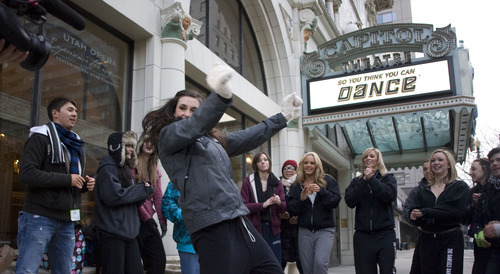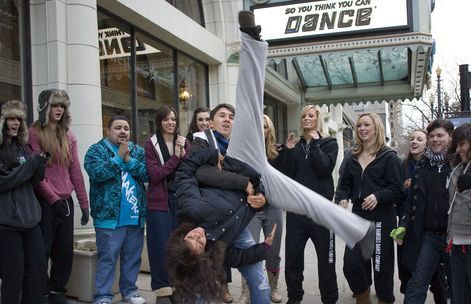This is an archived article that was published on sltrib.com in 2012, and information in the article may be outdated. It is provided only for personal research purposes and may not be reprinted.
"So You Think You Can Dance" has been great for Utah dancers. Not only has the show come to town for four auditions, but Utahns have had a lot of success on Fox's reality/competition series.
In fact, Utah has been overrepresented. Locals have made the finals in six of the eight seasons, including one in Season 5, two in Season 2, three in Season 6 and four in Season 4. Utahn Sabra Johnson won the title of "America's favorite dancer" in Season 3. The state's most recent finalist was Tadd Gadduang in the 2011 season.
Yet not everyone in the profession is enamored of the dance reality show. At the end of last season, The New York Times gathered a group of professional dancers to evaluate the show. In writer Elaine Stuart's story, they mocked the judges and the dancers, called the competition aspect "obscene," "cringed at the excessive kicks, splits and spins" and insisted, "These dancers wouldn't stand up to dancers in New York."
Creator/executive producer Nigel Lythgoe sounded indignant when he talked about the story's condescending tone.
"What I love about art in general is it has no barriers," he said. "There's no social barriers, no ethnic barriers. But art can create its own barriers. Which annoys the [expletive] out of me. Whatever way you can bring kids into the world of dance and have them passionate about it is the most important thing for me."
That's an opinion shared by Adam Sklute, artistic director of Ballet West and a former Joffrey Ballet dancer. "I love that dance right now is getting that much exposure," Sklute said. "I really think that, no matter what, that's beneficial to all of us who are in the business."
As for "So You Think You Can Dance" in particular, "I watch it all the time," Sklute said. "It's great."
—
It's a TV show • Dancers in the Times story criticized "SYTYCD" contestants for showing too much emotion. "This is totally for ratings," said one.
Well, yes, it is a TV show.
Gadduang acknowledged that dancers belittle the show — until they're cast in it. "When I got cut Season 5, I had that mentality — 'Oh, it's not a dance competition,' " he said. "Which is true. It's a television show."
But then he made the cut for the 2011 season. "You definitely do dance. I can attest to that," he added with a laugh. "They really make you dance. Did you know we were on IVs backstage? They dance you until you pass out."
"SYTYCD" is "unashamedly a reality show," said host Cat Deeley. "But you have to remember it's an entertainment show. Essentially, what we do is we find great characters and personalities and it's all about their stories. And dance is the narrative that runs through it."
—
Personality matters • Part of the reason the show crowns the "favorite" instead of the "best" dancer is that dancing talent alone won't win it for a contestant.
"A lot of it is personality," said producer Jeff Thacker. "We always say, 'Every smile's a vote.' It's about who you are as well as what you can do."
Personality plays a massive part in the competition, Deeley said. "Every year we have somebody who's a bit different or a bit quirky or has a great story," she said. "Because people who aren't necessarily into dance, that's what hooks them in."
Those stories have hooked Christiana Bennett, a principal dancer with Ballet West.
"I love that show!" she said. "I get so excited. I get really involved in the dancers. I get very invested in these people."
Which is why it doesn't serve contestants well to be reserved. Deeley pointed to Season 3 runner-up Danny Tidwell, "undoubtedly one of the most talented dancers we have ever had on the show." But judges described Tidwell as "arrogant."
"He didn't win because people have to connect," Deeley said. "That's what's going to make them get off their sofas and pick up their phones."
On the flip side, Utahn Gadduang made it all the way to the finals of Season 9 based on his performance and his smile.
"You can't underestimate somebody who's got a tremendous heart and soul," said judge Mary Murphy. "And that's what Tadd had."
—
Dancing diversity • A big part of the "SYTYCD" challenge is learning many routines in many disciplines — from ballroom to jazz to hip-hop.
Murphy, who was also annoyed by the Times story, said, "I would have loved to turn around to that prima ballerina that made those statements and say, 'Why don't you give this a try? Let's see how good you are when you have to go outside your style. Because, let me tell you, it's really difficult. To knock some of these kids and some of these performances that are outside their style is ridiculous."
What contestants endure has to be stressful, said Ballet West demi-soloist Rex Tilton. "That's the first thing I think of watching that show, especially for a dancer that's not real well-rounded," he said. "All the stuff they have to learn in such a quick time."
The contestants' lack of time before performances is impressive, Bennett said. "What they accomplish in such a short amount of time is just remarkable."
—
Popularizing dance • Given the proliferation of dance shows in the past eight years, it's easy to forget that Fox took a risk launching "SYTYCD." Deeley said she never expected to host a dance show on an American broadcast network.
"No way!" she said. "Maybe on the Sundance Channel. But on Fox? Dancing for the mainstream? When would that ever exist?"
And given that millions of Americans have watched the show over the past eight seasons, it has raised the profile of dance and dancers. "It's definitely made dance more popular," Murphy said. "It's definitely opened up the world of dance."
And it brought dance into living rooms, in the most meaningful way since the 1950s, said judge Adam Shankman. "It has absolutely given a renewed respect in our culture to the world of dance," Shankman said.
Lythgoe pointed to his efforts to make dance a part of school curriculums, and to studies that indicate that not only is dance great exercise, but it also can help stave off Alzheimer's disease.
"This not only improves your health and the obesity problem in this country, it improves your brain," he said. "So why the hell are we disrespecting dance as much as we do? And why the hell would people who are in the world of dance disrespect anybody else who goes into movement? I do not comprehend it. It's stupid and it's elitist and we have to stop it."
'So You Think You Can Dance'
P Season 9 of the reality TV series premieres Thursday, May 24, at 7 p.m. on Fox/Channel 13. It moves to its regular time slot on Wednesday, May 30, at 7 p.m. This year, the show will air once a week instead of twice.





